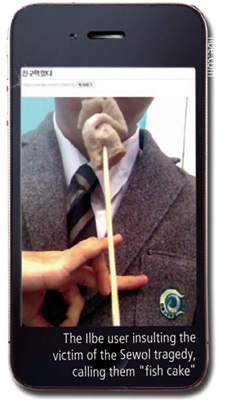
The use of negative, disruptive language on the Internet - profanity, trolling, and, in extreme cases, hate speech and bullying - is growing in Korean society, and it is raising serious concerns. Is this language then the consequence of what people in society think? Here is what we found after examining the current problems of internet language, their causes and possible results.
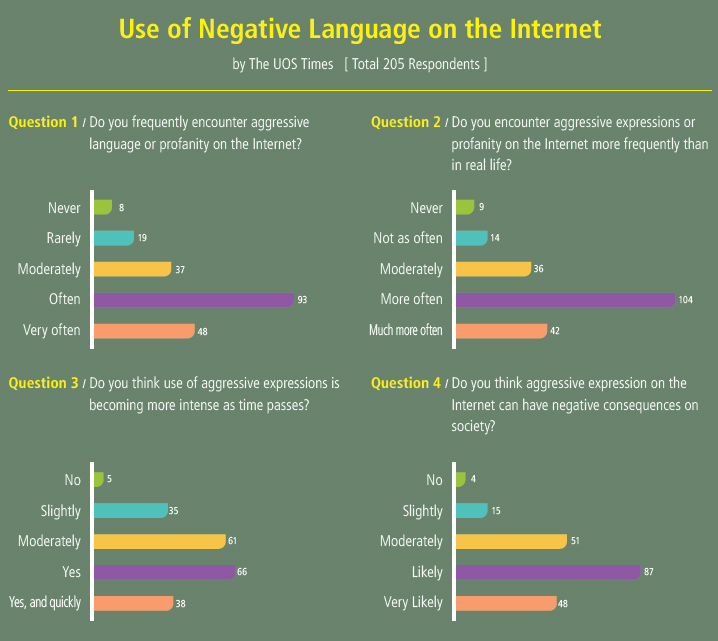
First, let’s consider how much people use the Internet, and how much content they are exposed to. The average person in his or her 20s uses the Internet for 20.5 hours per week, according to Statistics Korea. Studies have found that this average amount of usage has quickly supplanted face-to-face conversations, especially among younger people - 20.5 hours is therefore a tremendous amount of time to spend on the Internet. Now, with the new era of smart technology, we can easily access the Internet anytime and anywhere. We freely chat with friends on instant messengers and share ideas, activities, events, and interests within our social networks.
However, recent news may suggest that the Internet is not helping people become smarter or more socially communicative. As user-generated web content increases, the amount of inappropriate or objectionable content grows, as well. Is this change in the use of language a natural consequence of societal adaptation to new technology, or is it a sign of deeper social problems? The idea that language is a result of societal change may be traced back as far as the Greek philosopher Aristotle, who postulated that language follows thinking and that thinking follows existence. In this sense, online communities that are often plagued with negative content may reflect users’ thinking. However, on the Internet, individuals’ thoughts affect other individuals, leading to negative group thinking that can spread very quickly through an entire discourse and online culture. Last year, users of Ilbe, organized a physical gathering in Gwanghwamun Square and threw a pizza party next to the site of hunger strikes protesting the government response to the Sewol ferry tragedy. This Ilbe gathering provides a stark example of how far negative interaction may spread beyond the Internet: negative language that began confined to the Internet can cross a line into the physical realm, being enacted in public space. Negative language is not just an issue for Internet media; it leads to a social conflict.
The surveys conducted by The UOS Times on 205 UOS students indicate that students recognize the gravity of language use. Sixty-nine percent of students often encounter aggressive words or profanity on the Internet, and fifty-one percent said that they have experienced an increase in ill-usage over time. Moreover, seventy-one percent of respondents answered that negative expressions can be seen more easily on the Internet than in the non-digital world, and sixty-six percent said it can cause social problems. Thus, more than half of the students surveyed were aware of the increasing use of negative language and concerned about the consequences.
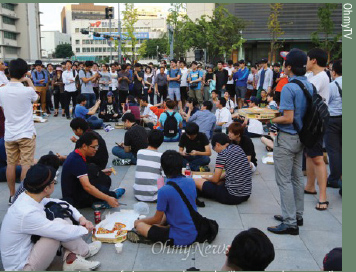
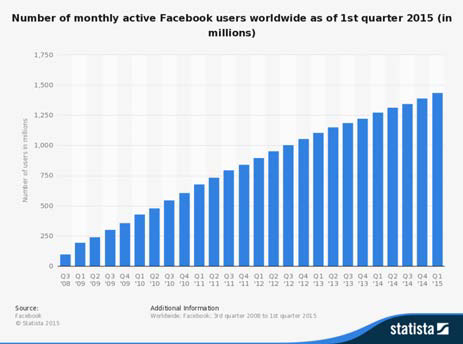
Technology - A Greenhouse for Conflict?
Thus, the situation seems real: negative interaction is increasing. If not, at least it is being observed more than ever, as statistics from the surveys by The UOS Times show. Is this increase in abusive content an inevitable part of human social struggle, or may we find a direct social cause, in addition to normal social and psychological factors? There are many theories about why people use abusive language.
First, let’s consider the environment - specifically, the rapid changes in communication across social media. The graph below shows the rising numbers of Facebook users worldwide. According to Facebook, the number of users has been increasing incrementally, with more than 1.4 billion in the first quarter of 2015. According to the Korea Internet & Security Agency, the number of social media users is also escalating in Korea, with the number of Facebook users reaching 13 million in March 2014 . With all of the other social media - including Twitter, LinkedIn, and Google+- as well the older forum technology and more specialized social media, humans now have broader connectivity and more access to social interaction than ever before.
Whether we are aware of it or not, the more we communicate, the more we learn. Given that humans are interacting more now than at any point in history, an increase in negative interaction may only be relative. However, we still have not discovered the reasons why people engage in abusive interaction. As we dig further, we may gain more insight into some of the features of social media that might encourage negative and abusive interaction.
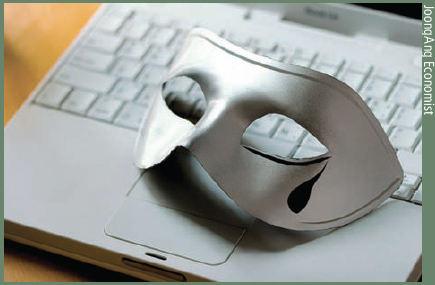
Seeds of Malice
Let’s consider one common form of abusive language: the expletive, or cursing. On the one hand, we consider people who use expletives to be aggressive or ill-mannered, or perhaps under so much stress in personal relationships that they seek opportunities to insult a stranger in social media on the Internet. However, people curse to express not only anger, but also many other feelings. Psychology professor Timothy Jay points out in his article “The Utility and Ubiquity of Taboo Words” that swearing “is like using the horn on your car,” and it “can be used to signify a number of emotions,” including anger, frustration, joy, or surprise. Writing for Psychology Today, Psychiatrist Neel Burton also suggests several reasons for cursing, such as pain relief, humor, peer and social bonding, and self-expression. In fact, cursing is nothing new. As a response motivated by fear or anger, it may be innate, the linguistic equivalent of barking for attention, or howling across a forest at another primate. For human society, there are as many causes for fear and anger now as there have ever been. The economy, employment, educational endeavor, and interpersonal relationships at any level - all of these factors will provoke emotion and the expression of these emotions through cursing.
There is another attribute of this technology that did not exist in human communication before the Internet: distance, and the safety that it provides to those engaging in negative interaction. With distance from their target, some people will not hesitate to use abusive language, feeling secure for themselves. Retaliation, too, occurs across the distance provided by cyberspace, thus encouraging a cycle of negative interaction that may continue over several exchanges.
Agreeing with the idea that distance is a significant attribute, Prof. Mun-woo Lee, an assistant professor of English Education at Hanyang University, said, “It seems as if spatial distance is affecting people’s linguistic behavior. Physical reprisal is impossible over the Internet, compared to the real world. Furthermore, physical distance can also bring a sense of social or psychological separation.” Thus, Internet users may be likened to children throwing stones at animals in a zoo. They do not dare to do so unless they are convinced of their own safety. However, once they start throwing stones, they begin to enjoy it. A fence or a cage is to these children what distance is to people who offend others on the Internet.
Thus, we can observe two main attributes - anonymity and distance - that may be encouraging a higher frequency of negative or abusive language on the Internet than in the real world. The next question is, how much does abusive language on the Internet affect a person’s thinking when offline, and, by extension, how much does this thinking spill outside the virtual world and into the external realm?

Consequences of Negative Language
According to the linguistic relativity hypothesis proposed by Edward Sapir and Benjamin Whorf, a language strongly affects how its users conceptualize their world and influences their cognitive processes. In simple words, if there is no word for the object, people do not recognize its existence. Prof. Lee sums up the importance of the Sapir-Whorf hypothesis: “In terms of sociolinguistics, a strong version of linguistic relativity tends to be rejected - linguistic expressions are not directly connected to social change. However, the weak form of the hypothesis is that use of language can affect one’s thinking, and this is widely accepted. As it continues and develops over time, I think that language usage may affect social change to some extent.”
Even if it is unclear whether ill-usage of language affects social problems, we can observe how it affects individual lives. One concern here is that profanity among individuals can produce a boomerang effect. That is, besides harming the intended target, negative language is also harmful to the person who perpetrates it. In recent months, several incidents showed how serious this effect can be. One media outlet revealed that a young reporter for KBS was a contributor to Ilbe. Despite the reporter’s apologies for his activities, the KBS Journalists’ Association dismissed his membership, with 91 percent of members voting in favor of barring him. It was the first time that a general reporter had been excluded from membership. In a similar way, anyone who applies for a position in a company may be subjected to scanning of their interactions on social media. The Korean recruitment agency Saramin recently conducted a survey of 450 corporate human resource managers. Fifty-seven percent answered that negative interaction on social media could have a crucial effect on recruitment decisions. Those who are in their 20s may not face such consequences immediately, but this boomerang effect may become clearer if negative interaction continues later in life.
Threats Unforeseen
The growing concern over negative or abusive interaction on the Internet is no longer just paranoia. With enough people and time, such language can become a powerful contagion, especially when technology is helping the spread. Using expletives or other forms of abusive language to gain relief from fear and anger can become addictive, as well, bringing unforeseen and unwanted consequences. There is no prescribed dosage for profanity, so people are not usually aware of how much they are giving or receiving, or of its possible side effects. Given the vastness of society and the slow rate of change within it, it is true that people might not believe their Internet communications will have any negative consequences in the near future. Thus, many people do not feel concerned about their interactions on the Internet. Is this casual attitude towards the Internet justified? The consequences not only provide topics for philosophical or sociological discussion, but they also impinge on daily life. One day, there could even be a one-year jail sentence handed to you for trolling on the Internet. Does this not matter to you, yet?
Yo-been Noh
ganjjiboy1268@uos.ac.kr
Shin-ho Ahn
ash906@uos.ac.kr

